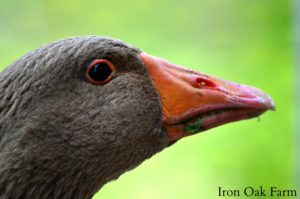 Geese are some of my favorite animals to have on the homestead. They have this regal-stoic quality as they waltz around the property. Head held high, lower beak up, like they are over-looking their lowly subjects.
Geese are some of my favorite animals to have on the homestead. They have this regal-stoic quality as they waltz around the property. Head held high, lower beak up, like they are over-looking their lowly subjects.
Despite their looks, our geese were incredibly friendly and would let you feed them out of your hand. Unfortunately, we had to re-home them because they kept going in the road and we were afraid they would get hit by a passing car. But if we ever put a fence across the front yard (like we plan) I will get geese again.
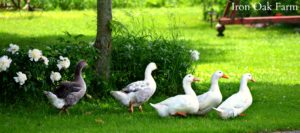 I feel like in the world of poultry and waterfowl, people just don’t keep geese on farms like they used to. If you look at bucolic paintings from past centuries, geese commonly dot the landscape and even the gathering marketplace.
I feel like in the world of poultry and waterfowl, people just don’t keep geese on farms like they used to. If you look at bucolic paintings from past centuries, geese commonly dot the landscape and even the gathering marketplace.
We originally got our geese on a whim. Our local farm store got in a special order of Toulouse and Pilgrim geese and the customer never picked them up. They were out-growing the brooder box the farm store had them in. They “know me in there” so when they saw me walk through the door they cornered me and asked if I would take some of their geese.
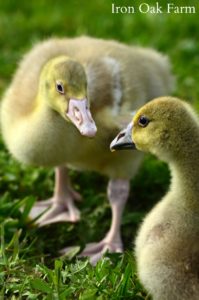 While the geese started out as a novelty addition, they actually turned out to be some of the most useful and cost saving animals on our farm.
While the geese started out as a novelty addition, they actually turned out to be some of the most useful and cost saving animals on our farm.
Here’s how:
- They protected our chickens and ducks
Our chicken losses due to predator attacks stopped, thus saving us money (and heartache). We were able to free range our birds and even leave them out after dark and there were zero attacks. Geese can see at night so when the chickens roosted in their coop, the geese would settle in on the floor and guard the door until we were able to close them up.
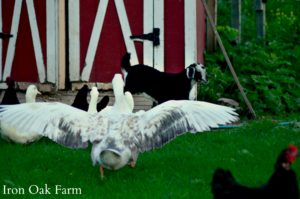
Geese shooing our goat away from the coop.
We had originally picked up a small flock of guineas to act as guard birds. Someone told me that guineas will sound off whenever there is a threat. And yes, this is true, but guineas will also sound off if there is no threat…pretty much they never stop making noise. Geese on the other hand, only really put up a fuss if there is an actual alarm. We also got to know the different honks. A deep honk was just “talking/complaining” but a high pitched honk meant something more serious.
A red fox made the mistake of coming near our coop one evening and our gander lowered its neck and took off after that fox like it was nobody’s business! The fox tucked it’s tail and ran! Our dog Oliver…a big golden retriever was petrified of the geese.
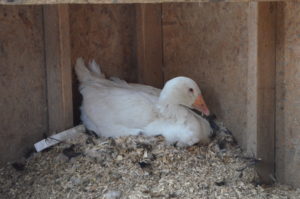 Geese are intimidating, they’re a really large bird with an impressive wingspan and they are afraid of nothing. Thankfully our geese were very sweet to humans (unless they were sitting on eggs…then our goose was like a devil dragon).
Geese are intimidating, they’re a really large bird with an impressive wingspan and they are afraid of nothing. Thankfully our geese were very sweet to humans (unless they were sitting on eggs…then our goose was like a devil dragon).
- They can allow you to sell/label your eggs as pasture raised.
Pasture raised eggs sell for more than other types of eggs and this is mostly because it takes a lot of effort to move chickens around to new pasture while keeping them secure. I believe that geese could really help in this.
Their ability to protect can allow you to let your chickens roam without fear of predator attacks. And you won’t have to spend money on fences or heavily secured runs.
- Geese are happy to eat grass
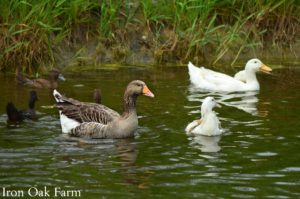 In fact they prefer it to store-bought feed. So essentially they are almost free to raise in the summer months.
In fact they prefer it to store-bought feed. So essentially they are almost free to raise in the summer months.
They also gobble up slugs, ticks and other pests while keeping the grass tended and leave compost/fertilizer droppings along as they go.
Geese need very little shelter in the summer. In fact ours were happy to be outside in the rain. And if you have a pond that they have access to, you don’t even have to provide them with water in the warmer months.
- Geese bring profits too
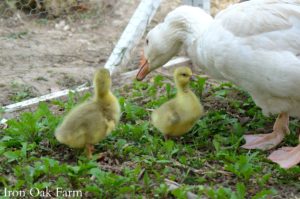 If you allow your geese to breed, the offspring can bring in a profit as well.
If you allow your geese to breed, the offspring can bring in a profit as well.
You can:
-Sell geese live or processed for table
-Sell goslings
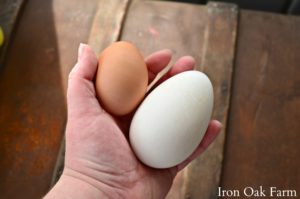 -Sell hatching eggs
-Sell hatching eggs
-There is also a market for goose eggs used as decorative carvings.
-At one time the down was a valued product but because of the new awareness of the ethical treatment of animals this practice is thankfully wanening. There might be a niche market for the down collected from processed animals.










